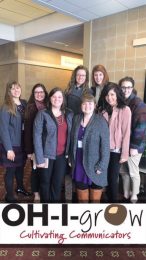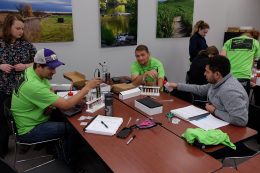Story by Kaci Foraker, freshman (ACJ)
Although Amanda Tomlinson did not initially plan on a career in agricultural communications, the field has given her many opportunities.
Tomlinson has been working as an editor for the Publishing Unit in the Department of Communications and Agricultural Education for the past two years. She edits and publishes research reports created by Kansas State University faculty.
The faculty that she edits for receive research funds from the Kansas Agriculture Experiment Station, which include agricultural experiment stations located throughout the state. Before these faculty submit publications to outside journals and papers, she reviews the manuscripts to ensure correct formatting and grammar.
“My role is helping faculty get their message out there by editing, printing and publishing their work so that farmers, producers, and others can read the material,” says Tomlinson.
Continue reading “Alumni and Department Feature: The Person Behind the Edits”


